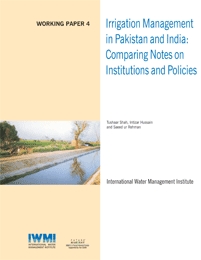Irrigation management in Pakistan and India: comparing notes on institutions and policies.
Citation:
Shah, Tushaar; Hussain, Intizar; Saeed ur Rehman. 2000. Irrigation management in Pakistan and India: comparing notes on institutions and policies. Colombo, Sri Lanka: International Water Management Institute (IWMI) v, 15p. [IWMI Working Paper 4]
Abstract
These notes present the impressions gathered by a team of Indian and Pakistani economists on contemporary issues in irrigation management in these two countries. The authors suggest that the two countries can learn important lessons by comparing notes on several issues: [a] what would work best in ensuring equitable access to irrigation – physical rehabilitation being tried out in Pakistan Punjab with the help of the army under the military rule offers interesting possibilities in terms of scale and impact as does the Andhra Pradesh model of irrigation reform, [b] the experience in both countries so far defies the uncritically accepted premise that under farmer-management, irrigation systems will be more equitable, [c] why farmers in Pakistan Punjab have to use 16-20 horsepower (hp) diesel engines to pump groundwater from 25-40 feet while north Indian farmers have been doing the same with 5 hp engines—if it is because of compulsion of habit, appropriate policies can save Pakistan substantial diesel fuel per year, [d] India needs to ask why diesel engines in Lahore cost only 40-50 percent of the retail price they command in Lucknow or Ludhiana—we suggest allowing free imports of Chinese pumps will do away with the need for pump subsidies that keep diesel engines over-priced in India, [e] both Pakistan and India need to pay serious attention to promoting simple pump modifications that can increase fuel efficiency of their pumps by 40-70 percent, [f] India and Pakistan need to compare notes on their rich experience of electricity pricing policies to achieve viability of electricity supply to farmers and to achieve important goals of groundwater management and policy.


